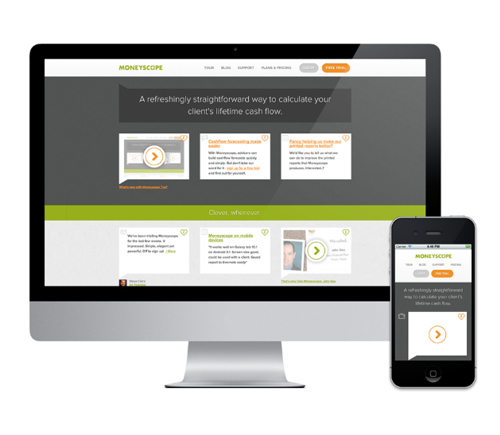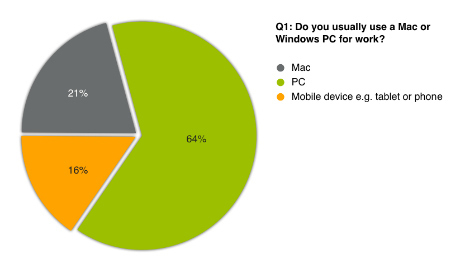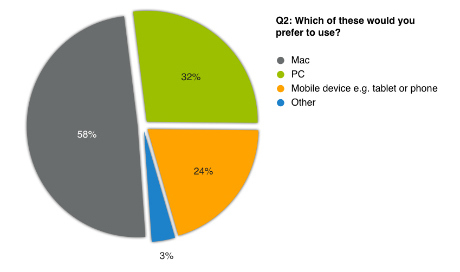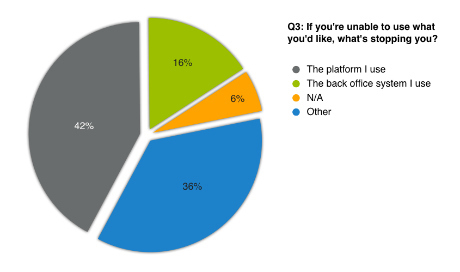Mac v PC

Given the choice, what would you rather use for work: a PC, a Mac, an iPad, an Android tablet or even a smartphone?
Just before Christmas last year, Moneyscope founder, Richard Allum, got involved in an exchange on Twitter about the use of Macs versus PCs among financial advice professionals.
And it was a tweet from Cofunds - who suggested that 'few IFAs ask for Mac use' - which led us to find out for ourselves about financial advice professionals' preferences when it comes to the use of Macs versus PCs.
 So we invited people to answer three questions:
So we invited people to answer three questions:
- Do you usually use a Mac or Windows PC for work?
- Which would you prefer to use?
- If you're unable to use what you'd like, what's stopping you?
We'll admit that, at 50 responses, the sample's not huge, but we still think you'll find the results interesting.
So what did we learn?
On the Mac/Windows PC split there were no great surprises (although the number of Mac users is higher than we'd expected): 64 per cent use Windows, 21 per cent use Macs and 16 per cent use mobile devices like an iPad or Android tablet, or a smartphone like iPhone or Blackberry.
 (In case you're wondering, the total percentage is greater than 100 because people were able to indicate more than one device that they usually use.)
(In case you're wondering, the total percentage is greater than 100 because people were able to indicate more than one device that they usually use.)
But when we asked 'Which of these would you prefer to use?' Mac preference shot up to 58 per cent and tablets increased to 24 per cent, but the desire to use Windows-based PCs halved from 64 per cent to 32 per cent.
In case you didn't catch that: the desire to use Windows-based PCs halved.
In other words, most of the people who responded to our survey would prefer to use Macs rather than Windows PCs; more would like to use tablets either in combination with Macs or Windows PCs, or on their own.
So what's the cause of this gulf between actual use and preferred use?
We asked 'If you're unable to use what you'd like, what's stopping you?'
The majority of users said that the platform they used was a barrier to using the PC they preferred, next came a raft of 'other' reasons (which you can see for yourself here) and then the third most significant barrier was the back office system.
So what's the big deal?
We've penned a post before which asked the question 'Who is financial services technology for?' so we won't go over old ground here.
But we do think that, these days, if you're invited to answer the question 'Given the choice, what would you rather use for work: a PC, a Mac, an iPad, an Android tablet or even a smartphone?' you ought to be able to say 'Why should it matter?'.
Users are voting with their fingertips: we've entered a world where people use multiple devices to access the software they like. And businesses are adapting too with information technology teams within leading businesses beginning to allow employees to use both Apple and Windows devices to access software which, increasingly, is hosted in the cloud.
So software designed for use by financial advice professionals - whether that's an investment platform, online application and quotation systems, transactional technologies and, yes, cash flow forecasting tools - should enable users to access the software they want using whichever device they like.
Basing product development on the largest share of desktop operating systems (OS) may work for now, but it's unlikely to work in the future.
While it's true that Apple's desktop OS represents a relatively small share of the the desktop and laptop OS markets, they do dominate share of tablet sales with a 68 per cent share of the global market.
And if forecasts like Gartner's recent report on the future of tablets is to be believed, Apple will retain 50 per cent share of a rapidly expanding market where, in 2015, global annual sales of tablets will hit an estimated 326 million - that's compared to annual sales of 17.6 million worldwide when the iPad launched in 2010.
So, in fact, it's not even an issue of whether users prefer Mac or Windows operating systems; what matters is that people are able to use whichever device they prefer.
But if, by 2015, the default setting of financial services software development continues to be based on the desktop dominance of Microsoft Windows's OS, then there's every risk users will vote with their fingertips in a much more significant way.
According to Gartner, annual tablet sales will have gathered such momentum by 2015 that, at 326 million units, global sales of tablets will be 60 per cent of total worldwide PC sales. At that rate, it surely won't take long for tablets to achieve parity with PC sales?
Either way, there may not appear to be a great deal of demand for alternative OSs to Microsoft Windows today, but that certainly won't be case in three years time.